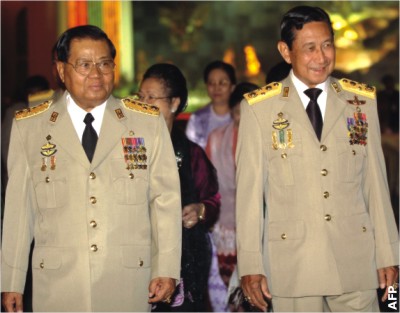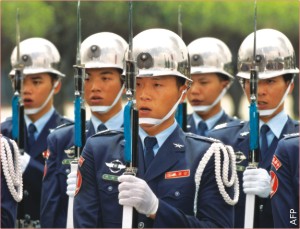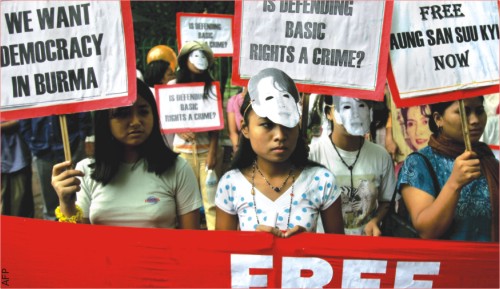
Inside
|
Beijing's new best friend Larry Jagan reports on the evolving strategic relationship between Burma and China Burma has now become Beijing's most important ally in Asia. China's support for the Burmese junta has strengthened immeasurably recently as the Chinese leaders have made Rangoon the corner stone of their revised strategy towards South-East Asia. Burma's internationally-shunned military regime has become a crucial part of Beijing's policy towards Asia in the face what it fears is the growing and unwanted influence of the US in the region. Since the beginning of the year there has been a flurry of diplomatic and business visits between the two capitals, with the aim of boosting economic, trade and technology ties. This included a secret mission by the Burmese army chief, Gen. Thura Shwe Mann to Beijing in May. But their burgeoning relationship is not without some irritation, as Beijing realises its close relationship with its unpopular Asian ally is likely to increase pressure on it from Burmese political activists and the international community, which has sanctions against the regime. Last weekend Burma's acting prime minister, Thein Sein returned from his first major visit to China. During his trip to the Chinese capital he met senior Chinese legislators from the National People's Congress and discussed a wide range of issues including political and economic matters of concern to both sides. Almost immediately the Burmese government hosted a large delegation from Beijing, from the China-Asean Association, which included government officials, legislators, and businessmen.
The Chinese delegation currently in Rangoon is mainly concerned to promote co-operation and communication, especially in the fields of politics, culture, business, technology and transport, between China and its Asean allies. Earlier this year a large official delegation from the Yunnan provincial government, including scores of businessmen, visited Rangoon and signed several significant contracts, including export contracts for steel and fertilisers, agricultural and scientific exchanges, and two mineral exploration and extraction deals. China is anxious to explore co-operation with Burma in almost all economic and business areas. During the visit of provisional Chinese officials three months ago, some six hundred businessmen from both countries discussed mutual co-operation, covering timber, bamboo and furniture, rubber, hydroelectric project, construction, mining, transportation, tea, beverages, sugar mill, textile, fertilizer and chemical, electric and electronic products, livestock and fisheries, machine parts and farm equipment. Some time ago China decided that Burma was crucial to its economic development, especially for the more backward southern regions of the country which have lagged behind the economic development along China's eastern coast. But while contact between China's provisional officials and businessmen flourished, Beijing remained cautious fearing that Burma was potentially unstable and may endanger China's long-term security and stability, especially in its sensitive border regions. For several years, until recently, China's leaders have feared that Burma's military junta lacked real legitimacy and could collapse overnight, leaving Beijing powerless and its military and economic investment in the regime worthless, according to a senior party cadre who deals foreign policy issues. There is no doubt that China's greatest fear remains Burma's stability. More than a million Chinese farmers, workers and businessmen have crossed into Burma in the last ten years and are working and living there. The Chinese authorities fear that any upheaval in Burma would result in a mass exodus of Chinese back across the border, creating increased industrial and social unrest in their sensitive border regions. In the past few years, Chinese businessmen and provincial government enterprises have boosted their investment in Burma -- Lashio, Mandalay and Muse are virtually Chinese cities now. Even in Rangoon, over the last two years Chinese business has expanded enormously. They are also involved in the building of a special tax-free export zone around the Rangoon port. "The number of Chinese restaurants in Rangoon has grown and the quality of the food served their far better than in Bangkok," according to a Thai-Chinese businessman. Some time ago the Chinese authorities decided that the only way to ensure their existing investment in Burma is to strengthen it. "Some six months ago, China's leaders sanctioned an increase in economic and business ties with Burma," according to a Chinese government official. "This would cover all areas, but especially the energy sector," he adds. China already has major oil and gas concessions in western Burma, and is planning overland pipelines to bring it to southern China. The Chinese have also agreed to finance and build several major hydro-electric power stations in northern Burma. For the Chinese authorities Burma is also an important strategic transit point for goods produced in southern China. They want to transport these by road to the Rangoon port for shipment to India, the Middle East, and eventually Europe. Repair work is underway on Burma's antiquated internal road system that links southern China, through Mandalay to Rangoon. Now there are fresh plans to rebuild the old British road through northern Burma that would connect southern China with north-east India. The Chinese have agreed to finance the construction of this highway using 40,000 Chinese construction workers, according to Asian diplomatic sources in Rangoon. Some 20,000 would remain after the work was completed to do maintenance work on the road. "When this happens the northern region of Burma will swamped by the Chinese -- government officials, workers, lorry drivers and businessmen -- it will no longer be Burma," according to a senior western diplomat-based in Bangkok who has followed Burmese affairs for more than a decade. Already along the Burmese border with China, every small town has restaurants and stores run by migrants from China, many have been there for more than a decade. Chinese teachers are also being recruited to work in the Chinese language and bilingual schools that are popping up in many of the major cities in northern Burma. Already in the major border towns in Shan state, like Mongla and Muse, only the Chinese currency -- the renminbi or yuan -- is used, Chinese calligraphy dominates the landscape -- billboards, street signs and shop fronts almost all use Chinese characters exclusively, very little Burmese writing can be seen. In some towns along the border the clocks are set to Beijing standard time rather than Burma's clock to facilitate cross-border contact, according to local Burmese officials. The Chinese authorities are planning to use Burma as a crucial transit point, not just for the products grown or manufactured in south-west China, but as a means of transporting goods from the country's economic power-houses along the eastern seaboard. "By shifting the transit route away from the South China sea and the Malacca straits to using Burma's port facilities to reach South Asia, the Middle East and Europe they hope to avoid the dangers of crowded shipping lanes and pirates -- the Malacca dilemma as Beijing calls it," a senior Chinese analyst told FORUM on condition of anonymity. But Beijing is also well aware that the junta's failure to implement political reform may back-fire, not only for Rangoon, but on China as well. Already under increased international criticism for its unswerving support for what the international community regards as pariah states -- especially Burma, North Korea, Sudan, and Zimbabwe -- Beijing has begun to distance itelf and take a more active role in trying to influence its allies to be more flexible. That has certainly been the case as far as Rangoon is concerned. Beijing has been far more pro-active behind the scenes in pressing Burma's military rulers to introduce political and economic reform as quickly as possible. They have also quietly raised the vexed issue of the detained opposition leader Aung San Suu Kyi, suggesting that she be freed. But when Thura Shwe Mann told the Chinese leaders in May that this was impossible as she still posed a security risk, they backed off. Instead they are now pressing both Washington and Rangoon, behind the scenes, to start a secret dialogue to try to overcome some of the issues which keep Burma internationally isolated. Beijing is also alarmed by Rangoon's nuclear ambitions and the recent deal with Moscow to build a nuclear reactor in Burma. China's leaders have already communicated their displeasure, according to Chinese government sources, and warned them that they could not rely on Chinese assistance if anything went wrong. China's leaders were also extremely annoyed at Rangoon's re-establishment of diplomatic relations with Pyongyang. "They no longer trust North Korea and were dismayed that two important neighbours had effectively gone behind their backs and resumed relations," according to a Chinese government source. Officially, of course, Beijing welcomed the development.
But despite these irritations, China's leaders have realised that Burma is by far its strongest ally in South-East Asia. For some time Beijing has eyed suspiciously the growing American influence in the region, especially in what it regards as its backyard and natural sphere of influence -- Cambodia and Vietnam, and to some extent in Laos as well. China's leaders now fear that in Thailand the opposition Democrat party is going to sweep back into power if elections are held according to plan in December. The Chinese also see the Democrats as avowedly pro-US and have already threatened to overhaul or rescind the free trade agreement between Bangkok and Beijing. And, of course, Beijing would not welcome Aung San Suu Kyi coming to power in Rangoon, as they regard her as an American puppet. So, for Beijing, this growing potentially hostile environment in Asia means their only trustworthy and truly anti-American ally in the region is Burma's military regime. So, strategically, the junta has become increasingly important to Beijing and seen as pivotal to its relationship with South-East Asia as a whole. While there may still be irritations between the junta and China's leaders, neither side is going to allow them to endanger what in the last six months has become a very special relationship indeed. It is one in which Beijing is likely to increasingly give Rangoon everything it wants. Larry Jagan is a former Current Affairs Editor, Asia, BBC World Service. |
 This increased diplomatic and business contact between the two countries is part of both governments renewed commitment to strengthen their new relationship. Both countries are keen to boost bilateral trade and investment ties as well as develop social and cultural exchange programmes.
This increased diplomatic and business contact between the two countries is part of both governments renewed commitment to strengthen their new relationship. Both countries are keen to boost bilateral trade and investment ties as well as develop social and cultural exchange programmes.
